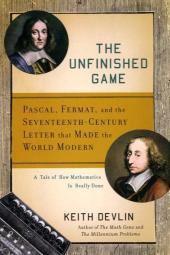
The Unfinished Game: Pascal, Fermat, and the Seventeenth-Century Letter that Made the World Modern
A Tale of How Mathematics Is Really Done
| Autor | |
| Quelle | Sonstige Datenquellen |
| ISBN | 978-0-465-00910-7 |
| Lieferbarkeit | nicht lieferbar |
| Katalogisat | Basiskatalogisat |
| Verlag | Basic Books |
| Erscheinungsdatum | 16.11.2009 |
Beschreibung (Langtext)
Before the mid-seventeenth century, scholars generally agreed that it was impossible to predict something by calculating mathematical outcomes. One simply could not put a numerical value on the likelihood that a particular event would occur. Even the outcome of something as simple as a dice roll or the likelihood of showers instead of sunshine was thought to lie in the realm of pure, unknowable chance.
The issue remained intractable until Blaise Pascal wrote to Pierre de Fermat in 1654, outlining a solution to the "unfinished game" problem: how do you divide the pot when players are forced to end a game of dice before someone has won? The idea turned out to be far more seminal than Pascal realized. From it, the two men developed the method known today as probability theory.
Das Problem, über das sich Pascal und Fermat brieflich austauschten, war nur ein abgebrochenes Glücksspiel. Doch was sie dabei entdeckten, sollte unsere Ansicht über die Zukunft revolutionieren. Die von ihnen erfundene Methode, die Wahrscheinlichkeit zu berechnen, mit der bestimmte Ereignisse eintreten, hat viele Errungenschaften der modernen Welt - vom Versicherungs- und Kreditwesen über Risikoabschätzungen und Kosten-Nutzen-Analysen bis hin zu Wetterprognosen und Demoskopie - erst ermöglicht. In seinem ebenso kenntnisreichen wie unterhaltsamen Buch erzählt Devlin, wie Mathematik, und Wissenschaft überhaupt, gemacht wird.
